Introduction
Being annoyed by the sound of someone else chewing can be incredibly frustrating. Whether it’s your co-worker chomping away on their lunch in the office or your partner crunching chips at night, it’s hard to concentrate when there’s loud chewing in the background. Fortunately, there are several strategies you can use to stop being annoyed by chewing.
Take a Deep Breath and Remember That It’s Only Temporary
When you first feel annoyance bubbling up inside of you, take a few deep breaths. Remind yourself that this situation is only temporary and that it won’t last forever. Taking a few moments to focus on your breathing will help to center you and reduce feelings of stress and frustration.
Once you’ve taken a few deep breaths, try to focus on something else. Listen to some music or an audio book, read a book, or chat with a friend. Doing something that takes your mind off of the chewing can help to keep you calm and relaxed.

Listen to Music or an Audio Book to Distract Yourself
Listening to music or an audio book can be a great way to distract yourself from the sound of chewing. Choose music or stories that you find calming and soothing. If you’re feeling stressed or anxious, try playing some classical music or jazz. You could also listen to an audiobook or podcast if you’d like to learn something new or hear a different perspective.
When selecting music or audio books, pay attention to the volume and tempo. Too much bass or drums can be distracting and overwhelming, so choose something that’s more mellow and relaxing. Also, make sure that the volume isn’t too loud; you want it to be just loud enough to drown out the sound of chewing without being too loud and intrusive.
Wear Earplugs or Noise-Cancelling Headphones
If you’re still struggling to ignore the sound of chewing, try wearing earplugs or noise-cancelling headphones. This will help to block out the sound of chewing and give you some peace and quiet. There are a variety of earplugs and headphones available, so take some time to research and find the ones that are right for you.
When choosing earplugs or headphones, look for ones that fit comfortably and securely. Make sure that they don’t put too much pressure on your ears or cause discomfort. Also, consider the noise-cancelling capabilities of the product you’re buying; some are better at blocking out sound than others.

Talk to the Person Who is Chewing and Ask Them Politely to Chew More Quietly
If the sound of chewing is coming from someone you know, consider talking to them about it. Approach the conversation in a polite and respectful manner; explain that the sound of their chewing is bothering you and ask if they would be willing to chew more quietly. Be understanding and patient; try not to get angry or frustrated.
Be aware of your body language and tone of voice as well. Crossing your arms and raising your voice will only make the situation worse. Instead, try to remain calm and speak in a low, gentle tone. This will help to ensure that the conversation remains civil and productive.

Move to Another Room or Area if Possible
If you’re able to, move to another room or area to get away from the sound of chewing. Even if it’s just for a few minutes, this can provide a much-needed break from the noise. Look for a spot that’s relatively quiet and comfortable; this could be a library, cafe, or even just a different part of your home.
Before you leave, let the person who is chewing know that you’re going to take a break. This will help to avoid any potential awkwardness or misunderstandings. Be sure to thank them for their understanding and respect before you go.
Get Up and Take a Walk Outside to Clear Your Head
Sometimes, getting up and taking a walk outside can be a great way to clear your head and refocus your energy. Walking around in nature can be particularly calming and therapeutic. Pay attention to your surroundings and take in the sights and sounds of your environment; this can help to reduce stress and anxiety.
If possible, try to find a quiet spot that’s away from the sound of chewing. This could be a park, forest, or beach; anywhere that’s peaceful and serene. Take some time to appreciate the beauty of nature and reflect on your thoughts and feelings. This can help to put things into perspective and make it easier to cope with the sound of chewing.
Practice Mindful Meditation to Help You Focus on the Present Moment
Mindful meditation is a great way to stay in the present moment and reduce stress and anxiety. It involves focusing on your breath and noticing your thoughts and feelings without judgement. When you practice mindfulness, you become more aware of your emotions and can better manage them.
To get started with mindful meditation, find a comfortable spot and sit in a relaxed position. Close your eyes and focus on your breath. Notice your thoughts and feelings without judging them. Stay in the present moment and allow yourself to simply be. Practicing mindfulness regularly can help you to better cope with the sound of chewing.
Conclusion
Dealing with annoying chewing can be difficult, but with the right strategies it can be managed. Taking a deep breath and reminding yourself that it’s only temporary can help to reduce feelings of frustration. Listening to music or an audio book, wearing earplugs or noise-cancelling headphones, having a polite conversation with the person who is chewing, moving to another room or area, taking a walk outside, and practicing mindful meditation can all be effective ways to stop being annoyed by chewing.
By implementing these strategies, you can reduce your stress levels and increase your overall wellbeing. With patience and practice, you can learn to manage your reactions to loud chewing and create a more peaceful and harmonious environment for yourself and those around you.
(Note: Is this article not meeting your expectations? Do you have knowledge or insights to share? Unlock new opportunities and expand your reach by joining our authors team. Click Registration to join us and share your expertise with our readers.)
